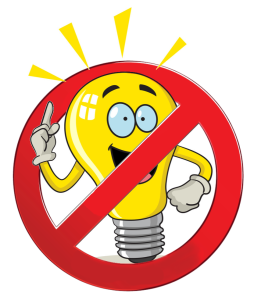That’s a Great Idea But…
That’s a Great Idea But…
We’ve all experienced it. Someone comes up with a great idea for doing something different, and better. Everyone agrees it’s a great idea, and better. And yet nothing happens. Nada. Zip.
How to explain this near-universal phenomenon?
Loss Aversion
I choose to looks at the phenomenon in terms of loss aversion (and its kissing cousin, the status quo bias).
We human beings have an outrageous number of cognitive biases. One of the most powerful of these biases is loss aversion.
Loss Aversion and the Status Quo
“In a nutshell, loss aversion is an important aspect of everyday life. The idea suggests that people have a tendency to stick with what they have unless there is a good reason to switch. Loss aversion is a reflection of a general bias in human psychology (status quo bias) that make people resistant to change. So when we think about change we focus more on what we might lose rather than on what we might get.”
~ Shahram Heshmat Ph.D., Psychology Today
The notion that losses loom larger than gains, originally formalised by Kahneman and Tversky (1979; Tversky & Kahneman, 1991; cf. Markowitz, 1952, p. 155), has proven to have tremendous explanatory power.
In addition to basic examples, loss aversion can help to explain a wide range of phenomena, including the sunk cost fallacy, the attraction effect, the compromise effect, anticipated and experienced regret, and the status quo bias.
Needs and Relatively Ineffective Strategies
In my work as an Organisational Psychotherapist, I see, daily, folks’ reluctance to give up on their “established” strategies for getting their needs met in favour of new strategies offering more effective means for seeing those needs met. Often, MUCH more effective means.
Where does loss aversion come into it? Loss aversion explains the hold these “established” strategies have over people. The promising new strategy may look attractive, but the fear of not getting their needs met (in case the new strategy doesn’t pan out) hugely outweighs the promise of the uplift in effectiveness from the new strategy, if adopted.
“One implication of loss aversion is that individuals have a strong tendency to remain at the status quo, because the disadvantages of leaving it loom larger than advantages.”
~ Daniel Kahneman (Kahneman 1991)
Conclusions
We fallible humans cling to our established strategies for seeing our needs met for fear of losing out if we choose a different strategy, almost no matter how attractive that new strategy may be.
For me, this goes a long way to explain “resistance to change” – which may more usefully be called “attachment to the status quo”.
Psychology and neuroscience offers some suggestions how to remediate loss aversion and status quo bias. I may explore these suggestions in a future post (given demand).
– Bob
Further Reading
Kahneman, D. (2011). Thinking, Fast and Slow. Farrar, Straus And Giroux.
Rick, S. (2011). Losses, Gains, and Brains: Neuroeconomics can help to answer open questions about loss aversion. Journal of Consumer Psychology, 21(4), 453–463. https://doi.org/10.1016/j.jcps.2010.04.004
Kahneman, D., Knetsch, J. L., & Thaler, R. H. (1991). Anomalies: The Endowment Effect, Loss Aversion, and Status Quo Bias. Journal of Economic Perspectives, 5(1), 193–206. https://doi.org/10.1257/jep.5.1.193
Rosenberg, M. B. (2015). Nonviolent Communication: A Language of Life. Puddledancer Press.


There’s a very early Dilbert cartoon that summarises this perfectly:
Just appointed: “Great idea! Let’s start straight away!!”
Five years in post: “We tried that five years ago. It didn’t work then and it won’t work now.”
Ten years in post: “No. If we do that, we’re all going to die or go to prison.”